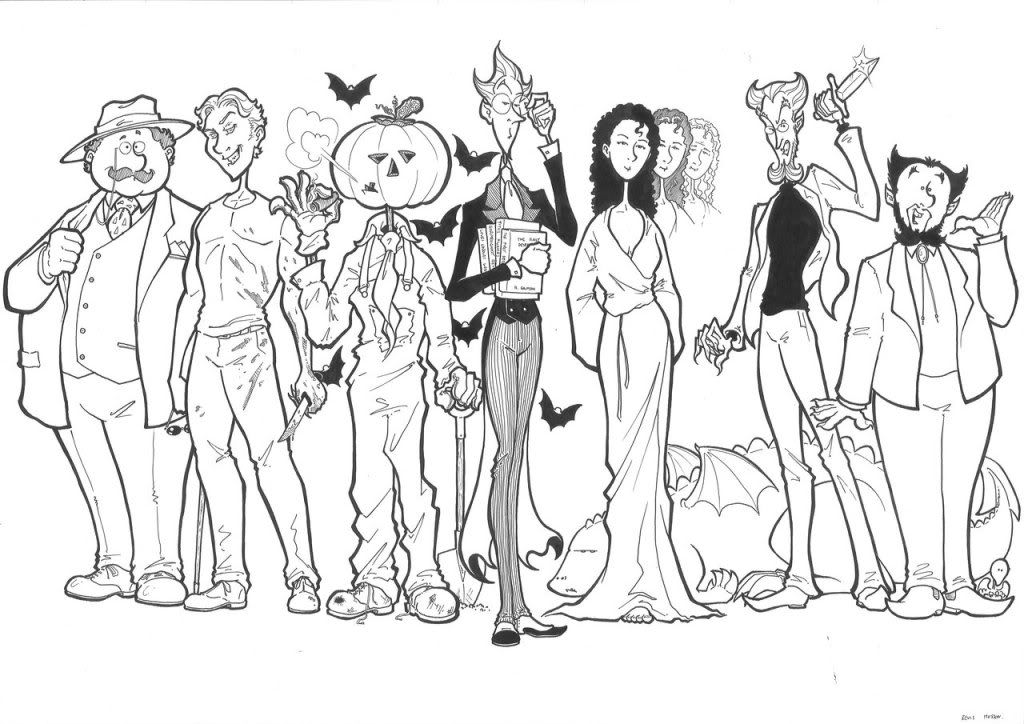
At last, the long-rumored episode that readers never forget, and probably never expect, for that matter.
I think this issue clearly demonstrates how the series has finally found the balance between horror and more subtle commentary. Gaiman understands that psychologically speaking, there is literally nothing more terrifying than a convention of serial killers, and he lets that speak for itself. He portrays them as characters one might see at a nerdy sci-fi convention (and lets be honest, at a certain point in the 80's/90's, and probably until this decade to be honest, admitting to being a sci-fi nerd was just as socially off-putting as admitting to being a serial killer).
But I digress. Back to the horror vs. subtle-goings-on thread. On first read, Gilbert's recounting of the Red Riding Hood story seems very much balanced to the former. But of course it's foreshadowing: like the fairytale girl, Rose is looking to visit a family member, only to find said person kidnapped by a killer. The link is further strengthened by their names: Rose and Red.
I'm pretty sure this is the first issue to be entirely contained within one setting, namely the Empire Hotel (please correct me if I'm wrong, but at the very least, there are usually scenes of Dream zipping about through dreams). So when Morpheus finally appears, he enters the scene like electricity; his presence is immediately felt. Even the Corinthian can't maintain his punny facade for long.
And of course, by revealing the truth of their actions to themselves, Morpheus deprives the killers of the only thing that justifies their actions: their delusions. He proves, yet again, that the worst punishment is neither incarceration nor death: it's the absence of things to look forward to, the absence of hope, the very absence of dreams [delusions in this case].
Next week: Things become very, very strange.


I'd say this issue is built on the premise that there's nothing funnier than a serial killer convention. Again, this is an idea that passed me by for many years. I had no problem understanding the story, but it wasn't until I'd been to a con that I really got it. It's all so terribly, terribly true.
ReplyDeleteThere's barely a moment in 'Collectors' that isn't being funny and creepy at exactly the same time. Look at the nerdy fellow on page one, singing Lydia the Tattooed Lady. Groucho Marx's voice is playing in my head, but over a scene that I'd rather my imagination couldn't conjure. Speaking of the Marx Brothers, I see one of the panel discussions is entitled There Is No Sanity Clause.
Ba-dum TISH...
Gaiman has an incredible discipline for this kind of writing. It's not unusual to find a story operating on two levels like this but it often creaks and staggers under the weight of the symbolism. Everything the collectors say and do makes sense on its own terms; they're just oblivious to how they look from the outside.
I wondered if the fairytale Gilbert tells Rose was intended as a fake-out. In Perrault's version of Red Riding Hood there's no woodcutter leaping in to save the day; it hints that yes, Rose may be living in a modern fairy tale, but that's an awfully dangerous place to be and we shouldn't assume she's going to make it out.
Incidentally, the full tale of the Bogeyman and his messy end in Louisiana can be found in Swamp Thing. Now there's a horror comic.
What do you think the Disney people made of Fun Land's little story about his hunting ground? "The people who run the place always hush it up. They don't want anyone to know I'm there either. They don't want people to stop going".
Naturally, the Velvet Underground are playing in the dance room.
Along with all the Big Bad Wolf symmetry in Fun Land's attack on Rose, I noticed the infamous 'It's a Small World' song could be a reference not only to Disneyland, but to Rose's power as a vortex. The way she draws all the renegade dreams to her makes it a small world indeed.
I could go on forever about 'Collectors' but there's just one more thing that struck me on re-reading. Previously I'd thought Morpheus's treatment of Diskin curiously merciful; he is after all an unrepentant child killer. But I don't think it is mercy - Morpheus just doesn't give a fuck, not unless you've messed with him or his creations.